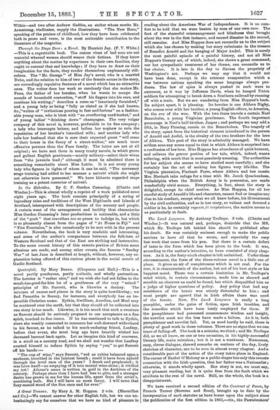Quatrefoil. By Mary Deane. (Chapman and Hall.)—This is a novel
partly ponderous, partly [esthetic, and wholly pretentious. The heroine is " rather nice," and we wish she had not fallen to the much-too-good-for-him lot of a gentleman of the very " mixed " principles of Mr. Snrcott, who is likewise a donkey. The mixture of names and places in the story is quite bewildering; we find Penartha in Surrey, for instance, and everybody has an im- possible Christian name. Eythin, Gwilliam, Aurelian, and Moel may be scattered over the earth, but that they should all be collected into one story is too much. Likewise, it is too much that such a creature as Snrcott should be seriously proposed to our acceptance as a fine spirit, touched to fine issues. If he has continued to talk to Eythin, since she weakly consented to renounce her well-dowered widowhood in his favour, as he talked to his much-enduring friend, Lanfrey, before that event, she must long ago have heartily wished her deceased baronet back again. Let us imagine this kind of converse, in a stroll on a country road, and we shall not wonder that Lanfrey exerted himself to induce Eythin by saying "yes," to get Snrcott off his hands:—
"The cup of wine," says Snrcott, "red as rubies balanced upon a sunbeam, trembled in the faintest breath ; could it have been upheld through the level race of the years ? I drank and prophesied ; it was Love itself—no emptying of it into mortal wine-skins ; it vivified my Art ! Athene's name is written in gold in the Archives of the century. Perhaps since then I have had less to give, and a stronger desire has grown in me for the human life, apart from the artist's, combining both. But I will have no more fancy. I will tame that fiery-maned steed of the Sun once and for ever."










































 Previous page
Previous page